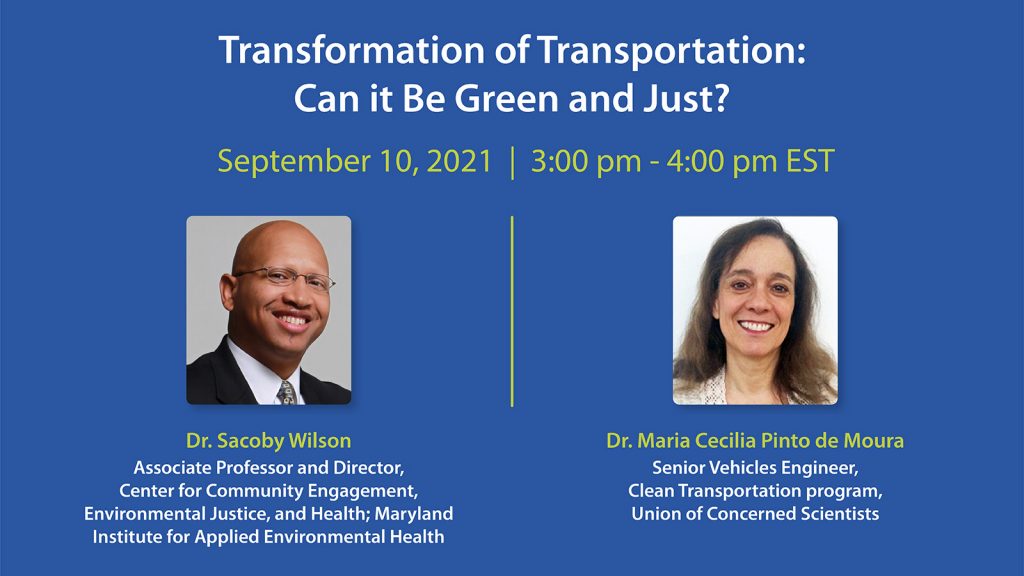Sep 10 Webinar: Transformation of Transportation: Can it Be Green and Just?
Friday, September 10, 2021 | 3:00 pm – 4:00 pm EST


Almost 30 percent of the nation’s carbon pollution comes from transportation. It is the largest contributor of greenhouse gas of any industrial sector. Successfully stemming climate change will require a radical transformation of the transportation system including the conversion to electric buses, cars, trucks, the electrification of ports and new technology in air travel. These changes will have an immediate effect in reducing asthma and other respiratory diseases in improving health, but they have the potential for leaving the most impacted communities behind.
Transportation is also the largest source of air pollution in the U.S. and tends to be concentrated in urban centers. Transportation pollution is associated not only with respiratory illness but also cardiovascular disease, learning disabilities (including ADHD and autism) and sudden death. The communities most impacted contribute the least to climate related air pollution. But cap and trade solutions have typically not decreased air pollution in environmental justice communities. Electric vehicles are out of reach for most Americans due to their high cost. For renters or condo owners who can afford electric vehicles, will there be charging stations available for multifamily housing?
Our speakers for this webinar will address these complex transportation equity issues and more.
Sacoby Wilson, PhD, MS, is an associate professor and Director, Center for Community Engagement, Environmental Justice, and Health (CEEJH) Maryland Institute for Applied Environmental Health School of Public Health University of Maryland-College Park. Dr. Wilson is an environmental health scientist with expertise in environmental justice and environmental health disparities. His primary research interests are related to issues that impact underserved, socially and economically disadvantaged, marginalized, environmental justice, and health disparity populations – including issues such as environmental justice, air pollution, housing disparities, built environment, climate change, drinking water quality, food justice, Port of Charleston, sewer and water infrastructure, goods movement, traffic exposure and health disparities, community-university environmental health partnerships, industrial animal production, exposures for subsistence fishers, and community revitalization.
Maria Cecilia Pinto de Moura, PhD, MS, is a senior vehicles engineer in the Clean Transportation program at the Union of Concerned Scientists. She conducts research on transportation energy and emissions and performs analyses in support of regional and national policy campaigns that aim to reduce oil use and mitigate vehicle emissions. Dr. Pinto de Moura also works with the UCS Climate & Energy modeling team on national transportation energy and emissions modeling.
***
This webinar series is part of the Consortium’s Climate and Health Equity Fellowship program.
Each month we bring in experts on climate and equity to speak on health and climate issues. This series is focused on perspectives from BIPOC speakers. The webinars take place the second Friday of each month from 3:00 pm – 4:00 pm ET.
